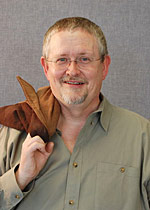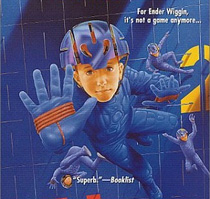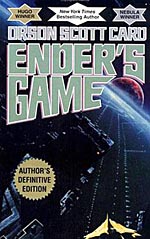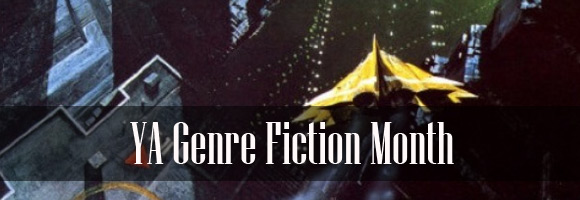YA Genre Fiction Month: Ender’s Game
“Sometimes lies were more dependable than the truth.”
 Orson Scott Card’s first story about Andrew “Ender” Wiggin has remained one of the most popular science fiction stories for young audiences ever since its publication as a novel in 1985. Considered to be one of the best Young Adult science fiction novels, Ender’s Game is far better even than Card’s own sequels to the novel. The story is simply told—a bragging point for Card in his introduction to the 1991 revised edition, against those who “play the game of literary criticism”—and its protagonist begins the story at the age of six, making the novel doubly appealing to young readers. It also presents a detailed and believable space-dwelling society, describing simply but thoroughly how life outside our planet might look.
Orson Scott Card’s first story about Andrew “Ender” Wiggin has remained one of the most popular science fiction stories for young audiences ever since its publication as a novel in 1985. Considered to be one of the best Young Adult science fiction novels, Ender’s Game is far better even than Card’s own sequels to the novel. The story is simply told—a bragging point for Card in his introduction to the 1991 revised edition, against those who “play the game of literary criticism”—and its protagonist begins the story at the age of six, making the novel doubly appealing to young readers. It also presents a detailed and believable space-dwelling society, describing simply but thoroughly how life outside our planet might look.
The story, for those who don’t know it, revolves around the ongoing war with the only known sentient alien species, termed the “buggers” because of their insectoid appearance. After the buggers’ second invasion almost wiped out Earth’s military forces, with the humans just barely pulling a victory, the government begins genetically manipulating children in the hopes of creating a military leader strong and intelligent enough to defeat the buggers once and for all. Ender is the third child of his family to be grown this way, leaving him with siblings who are exceptional, but flawed for the military’s purposes. Only Ender has the mixture of strength, genius, and compassion needed to make their plans work, so he is chosen as a mere child to begin training at the extra-terrestrial Battle School. It is there that his teachers make him into a weapon to save the Earth.
 Of particular interest are Card’s predictions of future technologies that are surprisingly similar to what we see around us today. The most obvious is the anonymous method of written communication over “the nets.” Two characters in particular make careers for themselves through pseudonymous writing on the public and electronic discussion groups. The only part of this prediction that seems unrealistic today is the belief that online discussions would ever be taken seriously by politicians. The other prediction is in the immersive electronic Game played by the Battle School children in their free time. Using an avatar to travel around a three-dimensional and fantastic world, solving puzzles and fighting battles in the meanwhile, their Game might as well be a version of World of Warcraft.
Of particular interest are Card’s predictions of future technologies that are surprisingly similar to what we see around us today. The most obvious is the anonymous method of written communication over “the nets.” Two characters in particular make careers for themselves through pseudonymous writing on the public and electronic discussion groups. The only part of this prediction that seems unrealistic today is the belief that online discussions would ever be taken seriously by politicians. The other prediction is in the immersive electronic Game played by the Battle School children in their free time. Using an avatar to travel around a three-dimensional and fantastic world, solving puzzles and fighting battles in the meanwhile, their Game might as well be a version of World of Warcraft.
 Ender’s Game is not beyond criticism. The novel’s plot feeds the natural but immature narcissism of young people by presenting a world that revolves around a brilliant young person rather than insisting on the need for young adults to assimilate themselves to the society which is much older and stronger than they are. (To be fair, this is a common problem in Young Adult novels, possibly the most common.) Even worse, it encourages a deep distrust of adults as cynical overlords who use children—the bright and perfect children—for horrible purposes. As Ender thinks to himself at one point, “The most important message was this: the adults are the enemy, not the other armies. They do not tell us the truth.” The real world provides enough tension between generations without novelists stirring up further hatred and distrust. Somewhat less annoying is Card’s blatant distaste for literary criticism and “encoded fiction,” which unfortunately serves to make the novel unmemorable aside from its plot and emotional content, as there is no reason ever to go back and enjoy any beautifully-written passages. There’s a fine line between wanting to write a straightforward story and being lazy and unimaginative.
Ender’s Game is not beyond criticism. The novel’s plot feeds the natural but immature narcissism of young people by presenting a world that revolves around a brilliant young person rather than insisting on the need for young adults to assimilate themselves to the society which is much older and stronger than they are. (To be fair, this is a common problem in Young Adult novels, possibly the most common.) Even worse, it encourages a deep distrust of adults as cynical overlords who use children—the bright and perfect children—for horrible purposes. As Ender thinks to himself at one point, “The most important message was this: the adults are the enemy, not the other armies. They do not tell us the truth.” The real world provides enough tension between generations without novelists stirring up further hatred and distrust. Somewhat less annoying is Card’s blatant distaste for literary criticism and “encoded fiction,” which unfortunately serves to make the novel unmemorable aside from its plot and emotional content, as there is no reason ever to go back and enjoy any beautifully-written passages. There’s a fine line between wanting to write a straightforward story and being lazy and unimaginative.
But despite my reservations, Ender’s Game is still one of the most memorable science fiction novels of the last few decades, and its flaws have not prevented its success. It is certainly the best of Card’s novels that I’ve read, and it was clever enough that I didn’t even suspect the twist ending until it hit me. A quick read that will never leave you bored, and might even make you think, Ender’s Game will undoubtedly remain a Young Adult genre classic for years to come.



















 Full Details
Full Details



5 Comments
I read this book last year, and I thoroughly enjoyed it. I never got the impression that the adults in the book were "cynical overlords" though, but rather that they were dealing with the ethical dilemma of the Battle School program as a "necessary evil". Several scenes reveal the doubt that Graff and his assistant (can’t remember his name now) had about their own actions and justifications. If anything, I think Card was hinting that children often distrust their elders, but don’t understand the whole context around why their elders make certain decisions, however good or bad.Also, though I don’t think Speaker for the Dead was as good as Ender’s Game, I think it is enjoyable and thought provoking on its own merits.
I enjoyed reading Ender’s Shadow very much. I thought Card set himself an interesting exercise in telling the same story as Ender’s Game from the perspective of a minor character. I’ve only read the first two of that Shadow series, but I think that I might like it better as a whole than the Ender’s Game series.
I read "Ender’s Game" back when I will a little 10-year-old being bullied at school. It was a very helpful book to read during that period of my life. It helped me to keep focused on academic and athletic excellence, instead of obsessing over the things people said and did to me. I think in my case, it was a matter of just hearing the right thing at the right time. The quote that still sticks in my mind after all these years is Mazer’s response to Ender’s complaint that all the children hated him:"What will you do about it? Crawl into a corner? Start kissing their little backsides so they’ll love you again? There’s only one thing that will make them stop hating you. And that’s being so good at what you do that they can’t ignore you." I don’t know how well it would stand up as a work of fiction now that I’m an adult, but it was a very important novel to me as a child.
@ncloud That’s a valid interpretation of the story, but even though Card acknowledges the moral ambiguity of what the adults are doing, the child’s point of view tends to insist on a certain "emotional certainty" that the adults are mucking things up and using the children simply as tools. It would be interesting to see the same story told from Graff’s point of view, making hard decisions that he knows might be wrong, but trying not to let his fondness for Ender get in the way. Regarding Speaker for the Dead, it’s worth noting that Card says in his introduction that Ender’s Game was only written as a set up for the second novel; odd how the story you expect to be important sometimes ends up being a footnote to a throwaway story.
Given what the author’s purpose was, it’s all the more ironic that this setup for "the real story", which was essentially pacifistic, wound up being required reading for Marine Corps officer training school!
Sorry, the comment form is closed at this time.